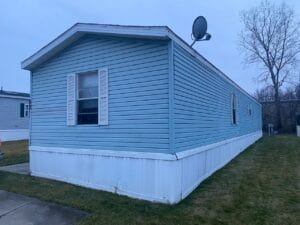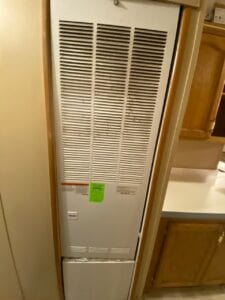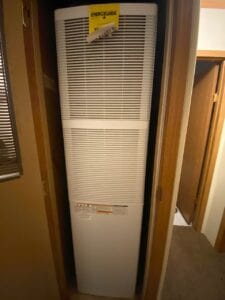A mobile home furnace is a heating system specifically designed for use in mobile homes. These furnaces are typically smaller and more compact than traditional furnaces. They are designed to fit into the limited space available in mobile homes.
Mobile Home Furnace
Mobile home furnaces can be powered by gas, propane, or electricity. They come in several types including:
Forced air: This type of furnace uses a blower to circulate heated air. It will move the air through the ductwork of a mobile home.
Gravity: This type of furnace uses natural convection to circulate heated air. Again the air goes through the ductwork of a mobile home.
Baseboard heaters: This type of furnace uses electric heaters. These are placed along the baseboards to heat a mobile home.
Hydronic: This type of furnace uses hot water to heat a mobile home. It’s less common in mobile homes but can be found in some larger double wides.
When selecting a mobile home furnace, it’s important to choose a unit that is properly sized for the square footage of the home. Make sure it meets local building codes and safety standards. Also, consider the fuel source available and consult with a professional for a proper installation.
Electric Furnace for a Mobile Home
An electric furnace is a type of furnace that uses electricity as a fuel source to heat a mobile home. It works by converting electric energy into heat energy. The heat, is then distributed throughout the mobile home using a fan and ductwork system.
Advantages of electric furnace for a mobile home:
They are relatively simple and easy to install
Electric furnaces don’t produce any combustion gases or pollutants.
They are generally considered to be safer than gas or propane-powered furnaces
You will find they are often more energy-efficient than other types of mobile home furnaces.
They can be a good option for those who do not have access to natural gas or propane.
Disadvantages of electric furnace for a mobile home:
They require a significant amount of electricity to operate. This can be more expensive than other fuel sources.
These units may not provide as much heat output as gas or propane-powered furnaces.
They can be less reliable in case of power outages.
It’s important to note that electric furnaces for mobile homes may require a specific electrical service upgrade. It’s important to consult with a professional before making any decisions.
Mobile Home Furnace: Old
An old mobile home furnace may have several issues that can affect its performance and safety. Some common issues with old mobile home furnaces include:
Reduced efficiency: As a furnace ages, its efficiency can decrease. This can cause it to use more energy and increase heating costs.
Rust and corrosion: Old furnaces can develop rust and corrosion, which can affect their performance and safety.
Worn-out parts: Over time, various parts of a furnace can wear out, including the blower motor, the heat exchanger, and the control module.
Duct leaks: Old ductwork can develop leaks, which can reduce the efficiency of the furnace and increase heating costs.
Safety concerns: Old mobile home furnaces may not meet current safety standards and can pose a risk of fire or carbon monoxide poisoning.
If your old mobile home furnace is showing signs of wear or is not operating efficiently, it may be time to consider replacing it with a new, more energy-efficient model. It’s important to consult with a professional to determine the best course of action, as an old furnace may pose a safety risk.
Are you looking for a mobile home furnace to be shipped right to your home. Check out this link for the best deals on furnaces.

Coleman Furnace Mobile Home
No matter what part you are looking for for your Coleman Furnace we can help. Click here and you can find parts for your Coleman Furnace. From boards, to switches to blowers. These parts will be shipped directly to your home.
Parts for Mobile Home Furnace
Are you looking for parts for your mobile home furnace? Filters, new door to the furnace, a new motor…then visit this link today. These parts can be delivered right to your doorstep. You can even order a new furnace through this company at a great price.
How Does a Mobile Home Furnace Work
A mobile home furnace works by converting fuel into heat energy and then distributing that heat throughout the mobile home using a fan and ductwork system. The basic components of a mobile home furnace include:
Burner: This is the component that burns the fuel (usually natural gas, propane, or oil) to create heat.
Heat exchanger: This is the component that transfers the heat from the burner to the air that is distributed throughout the mobile home.
Blower motor: This is the component that powers the fan that circulates the heated air throughout the mobile home via the ductwork.
Thermostat: This is the component that controls the furnace and tells it when to turn on and off.
When the thermostat senses that the temperature in the mobile home has dropped below a certain point, it sends a signal to the furnace to turn on. A burner then starts and begins to heat the heat exchanger. The blower motor then turns on and circulates the heated air through the ductwork and into the living spaces of the mobile home. A thermostat continues to monitor the temperature. This turns the furnace off when the desired temperature is reached.
It’s important to note that the specific operation of a mobile home furnace can vary. It really depends on the type of furnace, the fuel source. The model is important as well, but the basic principles remain the same.
Mobile Home Furnace Quit Working
If your mobile home furnace has quit working, there are a few things you can do to troubleshoot the problem:
Check the thermostat. Make sure the thermostat is set to the correct temperature. Also check that the batteries are not dead.
Check the power supply: Make sure the furnace is getting power. The circuit breaker or fuse box is another thing to check. Make sure to see the circuit hasn’t tripped or the fuse hasn’t blown.
Checking the air filter is important. A dirty air filter can restrict airflow. This can cause the furnace to shut off. Replace the filter if it is dirty.
Check the pilot light: If your furnace has a pilot light, make sure it is lit. If it is not, consult your owner’s manual for instructions on relighting it.
Check for blockages: Check the furnace and the ductwork for any blockages that could be preventing air from flowing through the system.
Check for leaks: If you suspect a gas leak, immediately turn off the gas supply to the furnace and call a professional.
If you are unable to troubleshoot the problem or if the furnace is not working after troubleshooting, it’s best to call a professional HVAC technician to diagnose and fix the issue.
It’s important to note that attempting to repair a furnace can be dangerous and it’s best to leave it to the experts to ensure a safe and proper repair.
No Heat in Mobile Home: Cold Weather
The amount of time it takes for a mobile home pipe to freeze depends on several factors, including:
The temperature outside: The colder the temperature, the quicker the pipes will freeze.
The insulation of the pipes: Pipes that are well insulated will take longer to freeze than pipes that are poorly insulated.
The location of the pipes: Pipes that are located in unheated areas such as crawl spaces, attics, or garages will freeze quicker than pipes that are located in heated areas.
The flow of water: Pipes that have a steady flow of water moving through them will take longer to freeze than pipes that have little or no flow of water.
In general, a mobile home pipe can freeze in as little as 24 hours if temperatures are very low and the pipe is poorly insulated and located in an unheated area. Pipes that are well insulated and located in heated areas may take several days or even weeks to freeze, even in very cold temperatures.
It’s important to note that once a pipe is frozen, it can burst if water continues to flow through it and increases the pressure, it’s important to take preventative measures to avoid pipes freezing, like keeping the thermostat at a consistent temperature, especially during cold temperatures, and insulating pipes that are located in unheated areas.
For more information on frozen pipes mobile home click here.
Filter for Mobile Home Furnace
A filter for a mobile home furnace is an important component that helps to remove dust, dirt, and other particles from the air before it is circulated through the furnace and into the living spaces of the mobile home.
There are several types of filters available for mobile home furnaces, including:
Fiberglass filters: These are the most basic type of filter and are inexpensive. They are not very effective at removing small particles and need to be replaced frequently.
Pleated filters: These filters have a higher surface area and can remove more particles than fiberglass filters. They are more efficient and last longer than fiberglass filters.
Washable filters: These filters can be cleaned and reused multiple times, making them more cost-effective in the long run.
HEPA filters: These filters are the most efficient in removing small particles and are often used in homes with allergy sufferers or those with respiratory issues.
It’s important to check your filter regularly, at least once a month, and replace it as needed. A dirty filter can restrict airflow and cause the furnace to work harder, reducing its efficiency and lifespan. It’s also important to check the manufacturer’s recommendations for the specific filter for your furnace, some filters have a higher MERV rating than others and may require a different replacement schedule.
Mobile Home Furnace Parts
There are several parts that make up a mobile home furnace, and each of them plays an important role in the proper functioning of the furnace. Some common parts of a mobile home furnace include:
Burner: This is the component that burns the fuel, as listed above and it burns natural gas, propane or sometime oil to make heat.
Heat exchanger: This component transfers the heat from the burner to the air that is pushed throughout the mobile home. If you find your mobile home has no heat but the furnace is on this could be an issue.
Blower motor: This is the component that circulates the heated air and distributes it throughout the mobile home via the ductwork. This is another thing to check if your furnace is kicking on yet no heat is coming through the home.
Thermostat: This little device controls the furnace and tells it when it should turn on and off.
Flame sensor: This is a safety feature that detects the presence of a flame and ensures that the furnace is working properly.
Control board: This is the electronic component that controls the operation of the furnace, it receives the signal from the thermostat and communicates with the other parts.
Limit switch: This is a safety feature that monitors the temperature and prevents the furnace from overheating.
Inducer Motor: This part is responsible for moving the air from the furnace to the outside.
It’s important to note that the specific parts of a mobile home furnace can vary depending on the type of furnace, the fuel source, and the model, but the basic principles remain the same. Some mobile homes may have additional parts, such as a humidifier, air cleaner or UV lights.

Mobile Home Furnace Home Depot
There are several places where you can buy a mobile home furnace, including:
HVAC supply stores: Many HVAC supply stores carry mobile home furnaces. HVAC store can help you select the right unit for your needs.
Home improvement stores: Some home improvement stores carry mobile home furnaces. These stores have knowledgeable staff who can help you select the right unit for your needs.
Online retailers: There are many online retailers that sell mobile home furnaces. They can offer a wide selection of models and brands.
Manufacturers: Many furnace manufacturers have websites where you can purchase their products directly.
Local HVAC contractors: Some local HVAC contractors sell and install mobile home furnaces. They may have special deals or promotions.
When buying a mobile home furnace, it’s important to consider the size and type of furnace. You will want to make sure that is appropriate for your mobile home and the fuel source available.
It’s also important to choose a unit that meets local building codes and safety standards. It’s a good idea to consult with a professional. They will help to determine the best furnace for your needs. They will also ensure a proper installation.

Mobile Home Furnace: Conclusion
In conclusion, your mobile home furnace is important. Whether it’s running smoothly or it has quit. Repairs are quite expensive when it comes to a furnace. Changing filters and doing yearly maintenance will help your furnace continue to run smoothly.
Note: If you have problems with bugs in your home know that bugs love to get near the furnace area. I Saw One Cockroach Should I Be Worried is a great article to review.
FAQ’s: Mobile Home Furnace
What kind of furnace do I need for a mobile home?
For a mobile home, you typically need a furnace specifically designed for mobile homes, often referred to as a manufactured or mobile home furnace. These are typically more compact and have the necessary ductwork and ventilation suited to the mobile home’s construction.
What is the difference between a mobile home furnace and a regular furnace?
The key difference between a mobile home furnace and a regular furnace lies in their size and design. Mobile home furnaces are smaller and more compact to fit within the limited space of a mobile home and are often more energy-efficient.
What size furnace do I need for my mobile home?
The size of the furnace you need for your mobile home depends on factors like the home’s square footage, insulation, and local climate. It’s essential to have a professional calculate the appropriate furnace size to ensure efficient heating.
Why do mobile homes need a special furnace?
Mobile homes require a special furnace because they have limited space and unique ductwork configurations. Specialized mobile home furnaces are designed to fit these constraints while maintaining heating efficiency and safety standards.
Are you looking for a mobile home furnace to be shipped right to your home. Check out this link for the best deals on furnaces.
